This preview and the 2014 College Tour are presented by Spin Ultimate.
“I am going to punch you in the face.”
Rain was coming down in sheets in San Diego, a city with so little rainfall that its weathermen are a national joke.
President’s Day 2005 was a nightmare in every possible way. Constant driving rain forced UCSD to shut down the tournament fields and seek emergency backup. Teams shuttled across the city onto baseball fields, parks, and pathetic grassy patches belonging to unconsenting elementary schools and libraries. People flew from around the country for this prestigious tournament, and the Air Squids sure as hell weren’t going to let a brief weather respite on Sunday go unrewarded after a full Saturday rainout.
My team, UCLA, was going nowhere. We played games of glorified mini on obscenely muddy 30-yard fields as one team after another blew us out. At some point, I made a comment to a teammate about his defensive positioning. The next point we turned it over and I got scored on. My teammate blew up in my face, taunting “Yeah! Yeah! You got scored on. How does it feel?” I lost it, threatening to beat him up in one of those pathetic hold me back basketball fights. The captains suspended us for the rest of the game, and our team went winless on the tournament. The rest of the field finished up their pool play matchups and got the bad news: no games on Monday.
What began as a slow trickle of angry Tuesday phone calls from concerned parents turned into a deluge of righteous indignation at UCSD’s administration for allowing its ultimate frisbee program to destroy perfectly decent fields all across the city. UCSD briefly suspended the Air Squids from practicing, cancelled President’s Day the following year, and blew out its transmission on the freeway by downshifting from Colorado, Oregon, and Texas to Chico State and Santa Clara, shifting the winter tournament locus of power five hours northeast to Las Vegas.
While Trouble in Vegas had its highlights, President’s Day always felt like a singular, unified community event. At its peak, this was the premier gathering place in the Southwest. It’s where Parker Krug ripped 50-yard thumbers in the finals; Colorado first unleashed Beau on the world; UCSB’s Black Tide scowled their way into the hearts of no one; and where Cal’s Bart Watson and Gabe Saunkeah destroyed souls. It also had a profoundly wacky streak that mirrored UCSD’s unconventional team ethos. (An Oregon player unveiled a spike involving a glazed fruit pie. Claremont attempted to have teams drink a gallon jug of urine under the guise of a “mystery box.”) And I remain convinced that no tournament experience tops sitting in the bleachers for an evening showcase game at RIMAC Field as the sun sets over the Pacific Ocean, cool breeze soothing sunburned flesh.
It took six full years for the tournament to regain its relevance. 2011 saw the return of Minnesota, Texas A&M, Kansas, Oregon, and Texas, 2012 welcomed back Colorado and Brown, and in 2013 the NexGen network turned the spotlight again on RIMAC, Warren, and Muir. The inevitable implosion of Trouble in Vegas and private tournament host Cultimate enabled President’s Day to have the throne once again.
It occurred to me recently that I never once stepped foot in San Diego despite visiting La Jolla for four straight years. There was no need if you attended President’s Day. Everything you love about San Diego – the weather, craft beer, relaxation, and yes, the Hawaiian shirts masquerading as formal attire – can be found where one stands. It’s taken nearly a decade for the tournament to return to the national consciousness. Let’s do our best to keep it there, rain or shine.
Pool A (all seedings are preliminary)
1. Colorado
8. Washington
9. California
16. Whitman
17. UCSB
————————————————————
Can anyone stop them?
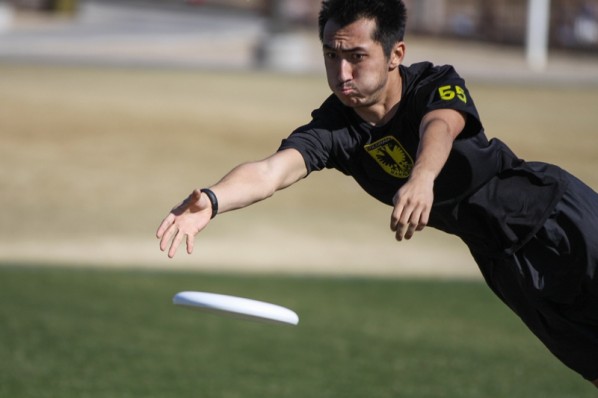
All signs point to another Colorado Nationals appearance and the title is well within their reach. Can anyone stop Mamabird from grabbing top honors? Image Credit – Alex Rentzis (Ultiphotos.com)
Mamabird play much like their older brothers Johnny Bravo. They put big, strong athletes on an island and give them as much space as possible to get the disc from their creative handlers. The same problem, however, tends to plague both teams: one-dimensionality. The predictability of Mamabird’s offense leads to junky defensive looks and bracketing downfield cutters, neutralizing their athletic advantage. This may have been the impetus for attending club tournament New Year’s Fest, where intelligent older club players know better than to try to chase young athletes around the field. What’s really scary is that they won that tournament. Jimmy Mickle has been running supernova hot for the better part of two years and he may finally have the supporting cast to match. With an impressive tournament win at President’s Day, Mamabird will have officially entered 2002 Stanford territory.
The overlooked
It may be shocking to learn that Walla Walla, Washington is not a hotbed of ultimate. Carleton excepted, it’s extremely difficult for a small liberal arts school of 1,500 to survive and thrive against state schools drawing from a population of 40,000. For Whitman captain Ethan Parrish, this can be an advantage. “We can build a team from scratch that’s all on the same page,” says Parrish. Players do come to Whitman with some previous experience, but the team mostly relies on isolation-induced team unity and institutional knowledge to carry the program from year to year. Whitman burst onto the scene in 2010 with a 2nd place finish at DIII Nationals. They made DI Nationals in 2011 and lost in heartbreaking fashion in two straight games-to-go against Washington. Suffice it to say, they have that 9AM Saturday game against their arch-rivals circled in bright red marker on the calendar.
The Sweets shocked many last year with their performance at the Stanford Invite, downing Wisconsin and UNC-Wilmington in impressive performances. Despite these wins, Whitman was not invited to the tournament this year, instead receiving the same offer to qualify through the Stanford Open. They decided to “diversify their experience” this year by coming to President’s Day instead – the first visit to La Jolla in many years, according to Parrish. Whitman will also be making a trip east to Easterns, hoping to secure an extra bid for the Northwest region. Parrish won’t let his team look too far into the future, but it’s going to take an inspired performance to get past UBC, Oregon, and Washington in the Northwest. How hungry are they to make it back to Nationals? “How hungry can you be?”
Pool B
2. Oregon
7. Arizona
10. Las Positas
15. Oklahoma
18. UCLA
————————————————————-
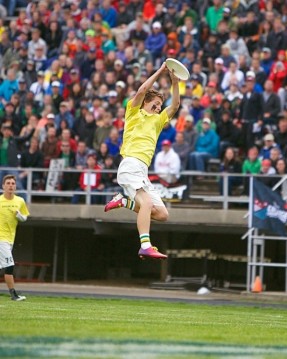
Numerous key departures means Freechild will need to somehow have even more on-field impact for Ego to be successful. Image Credit – Alex Fraser (Ultiphotos.com)
The enigma
Every ultimate pundit is contractually obligated to report that Oregon is no longer playing recklessly . There was never a throw they didn’t like; no step-around backhand that couldn’t be accomplished with a high-release forehand; no huck that seemed too reckless. Ego has changed with the consistent coaching of Jay Janin, and the results speak for themselves: semifinals berths in 2012 and 2013 with aggressive man-to-man defense that complements one of the prettiest offenses in the game. Dylan Freechild is a frenetic pinball, changing directions on a dime and burning his defenders point after point. Oregon has played a fairly low-key schedule thus far, so it remains to be seen how the loss of big-play threats Aaron Honn and Camden Allison-Hall will affect this team along with the departure of 2013 captains Topher Davis and Tyler Cable. But this is probably it for Freechild. There’s no replacing a player of his caliber. If Oregon wants to go all the way, it needs to do it now. Anything less than a finals berth at President’s Day would be a major misstep towards that goal.
No more excuses
Yes, I’m a giant homer. But in a region as much of a crapshoot as the Southwest, why can’t UCLA make Nationals? It’s a giant school with beautiful fields abutting the main campus drag and plenty of athletes to choose from. It has 2012 Junior Worlds player and former Paideia captain Nils Clauson. Heck, Spin Ultimate has even named Smaug one of its Elite College Teams this season along with UCF, UNC, and Minnesota. They’ve already beaten Stanford and UC Santa Cruz and came within one point of defeating UC Davis at the Santa Barbara Invite. Since the regional realignment of the 2011 season and the departure of primary beatdown deliverer Colorado, the Southwest has sent UC Santa Cruz, Stanford, UC-Berkeley, UC Davis (the only repeat), and Arizona to the big show. The field is wide open once again. The Southwest pretty much lives or dies by gaining a third bid, but the lack of out-of-region travel has hampered those efforts in recent years. Poor showings at the Stanford Open and President’s Day could very well render these thoughts moot, but I’ve learned not to assume anything in the Southwest. UCLA will need an extremely lucky draw and some gutty performances, but could very possibly sneak its first Nationals berth in around 25 years of existence.
Pool C
3. UCSD
6. Brown
11. Vermont
14. Victoria
19. Northern Arizona
————————————————-
Home field advantage
Ah, to be the home team. Blessing or a curse? You can eat your own food, sleep in your own bed, and kiss your girlfriend goodbye in the morning. But as Wisconsin knows all too well from last year’s showing at the College Championships, hometown pressure is real. There is something about the camaraderie of renting a block of hotel rooms and eating in the same restaurants that help bond a team together, let alone avoiding the distraction of tournament preparation and logistics. That said, UCSD is having quite the run. Early season tournament wins at Sean Ryan and the Santa Barbara Invite have pegged the Air Squids as early favorites out of the Southwest. UCSD has a deep team mainly comprised of fourth and fifth years that took over the team after the last major turnover following a Nationals run in 2010. UCSD plays loose with its assignments. Players aren’t necessarily assigned to a specific handler, cutter, or defensive role, and the team looks to exploit the best matchups on a point to point basis.
The Air Squids had four players play on club team Streetgang this year. Their coaches also lead Streetgang, and the offensive and defensive sets are similar between college and club. Captain Nicholas Smith says it “helped our game to compete at the club level and train all summer, so that we could continue building as we rolled into the college season instead of having to backtrack the first few months. Our team as a whole is much farther ahead than where we were at this point in the season last year.” Regionals in the Southwest is always a dogfight because of a handful of teams ranked between 20-75 that are “very dangerous and have the ability to ruin the dreams” of any other team. There is an immense amount of pressure to perform at a high level consistently through the whole weekend at Regionals. If UCSD makes it back to Nationals, it will certainly have to earn it. Rolling its pool at President’s Day would be a good place to start.
Pool D
4. Cornell
5. British Columbia
12. California-Davis
13. San Diego State
20. Cal Poly-SLO
———————————————————
Beast from the East
There’s a region that’s ignored, easily mocked, and quickly dismissed – the product of much eye-rolling and contempt. The Metro East is putrid – you know it, I know it – but take a moment to appreciate the longevity of Cornell. Five straight years of Nationals berths are impressive in a region that perennially sends one team. This route is emotionally exhausting because it requires the team to peak at regionals, setting up the inevitable sugar-high crash and subsequent disappointing performance at nationals (see: George, Furious). No more. Cornell now expects to compete in ultimate’s final tournament and is shifting its strategy to take the long view. “We’ve gone to nationals five years in a row but since 2010 haven’t made a splash,” says Buds captain Jake Stevelman. “Last year we finished 13th at nationals, which you may not consider legitimate since we only won one consolation game. This year we went in with a different attitude. I told our seniors and other team captains that I don’t want to go into this season with our goal being to win the region again… We’re more interested this year in proving ourselves as a dominant force in the nation.”
This is Cornell’s first tournament west of the Mississippi in quite some time. Stevelman wanted to “mix things up” by playing against teams they may see at Nationals that they rarely play against during the regular season. Unfortunately, President’s Day may be the last tournament where Cornell faces top-level competition; issues with the school’s Spring Break schedule have eliminated some of the choicer options. For this weekend, Stevelman and co-captain and junior defensive leader Franklin Li are particularly excited about the chance to face Oregon, as they bring a “smooth offense comparable to Sockeye’s offense in the way they are very quick with the ball.” Li, according to Stevelman, has been “dying to go at Dylan Freechild” since he’s been in college. Be careful what you wish for, Franklin.
The most livable city in the world
Vancouver, by some estimates, has the largest contingent of ultimate frisbee players in the world. According to Thunderbirds captain Keane Knapp, the city recently sent eight full teams to Canadian Junior Nationals. Naturally, that base has been the source of dozens of top-end players for the University of British Columbia. The team has a highly symbiotic relationship with club team Furious George, and longtime Furious defensive firebrand Marc Seraglia returns as UBC coach to preach process over results. The team is enjoying its exodus from frigid temperatures in Vancouver with back-to-back trips to Southern California. The team made the finals of the Santa Barbara Invite by winning games with their legs and playing honest man-to-man defense, avoiding defenses that Knapp calls “gimmicky.” UBC hopes their play at President’s Day results in a third bid for the Northwest region and an eventual trip to nationals for the first time since a senior-heavy lineup of John Norris, Aaron Liu, Aaron Loach, and Matt Berezan swept through the region in impressive fashion in 2011.
The unlikely stalwart
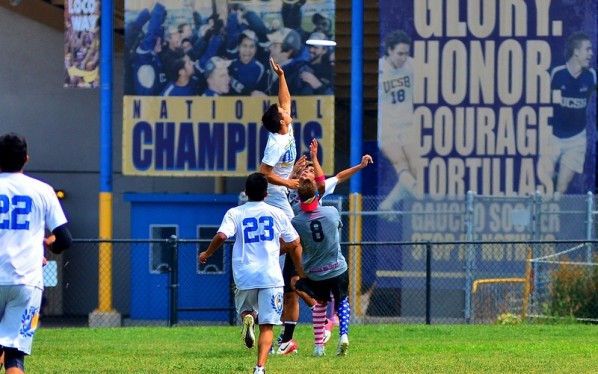
In a region of turmoil, UC-Davis takes it one game at a time. This could work to their advantage as every game will pose a different challenge in Pool D. Image Credit – Alex Carey (Ultiphotos.com)
UC-Davis has become something of a constant in a region that, of late, loves to mix things up. In the Southwest, two straight years at nationals is a dynasty, but Davis is well poised to return. The team shocked the world last year with a victory over Wisconsin in pre-quarters after a mediocre regular season and all-around curb stomping at the Stanford Invite. Former NexGen stud Eli Kerns and Nathan White are back to lead the team, but don’t tell that to former JAM star and current Davis coach Kevin Cissna (who claims tongue-in-cheek that most of the players have no idea he ever played high-level ultimate). He stresses that the team is a faceless army and points out that everyone will need to contribute by the end of the year for the team to be successful. Where Cornell takes the long view, Davis literally takes it one game at a time. “We’re looking to play one game at President’s Day, and that’s it,” says Cissna. “Are we looking at nationals? Not at all.” Any talk about excitement to play certain players or matchups is squashed immediately. “I don’t know who’s in our pool. I don’t even know who’s going. I honestly don’t even care who’s going. When players talk about teams I get on them.” Davis is a team that lets its play speak for itself.

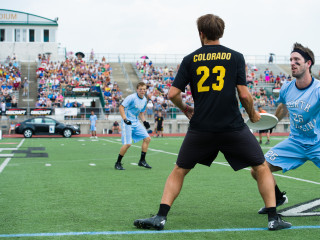
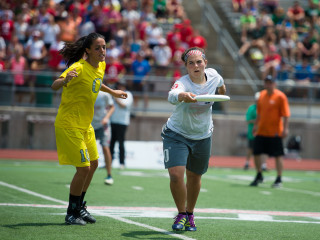
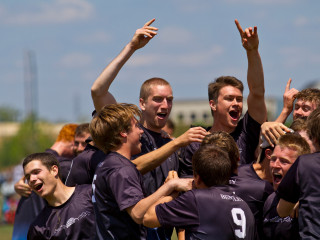





Comments Policy: At Skyd, we value all legitimate contributions to the discussion of ultimate. However, please ensure your input is respectful. Hateful, slanderous, or disrespectful comments will be deleted. For grammatical, factual, and typographic errors, instead of leaving a comment, please e-mail our editors directly at editors [at] skydmagazine.com.